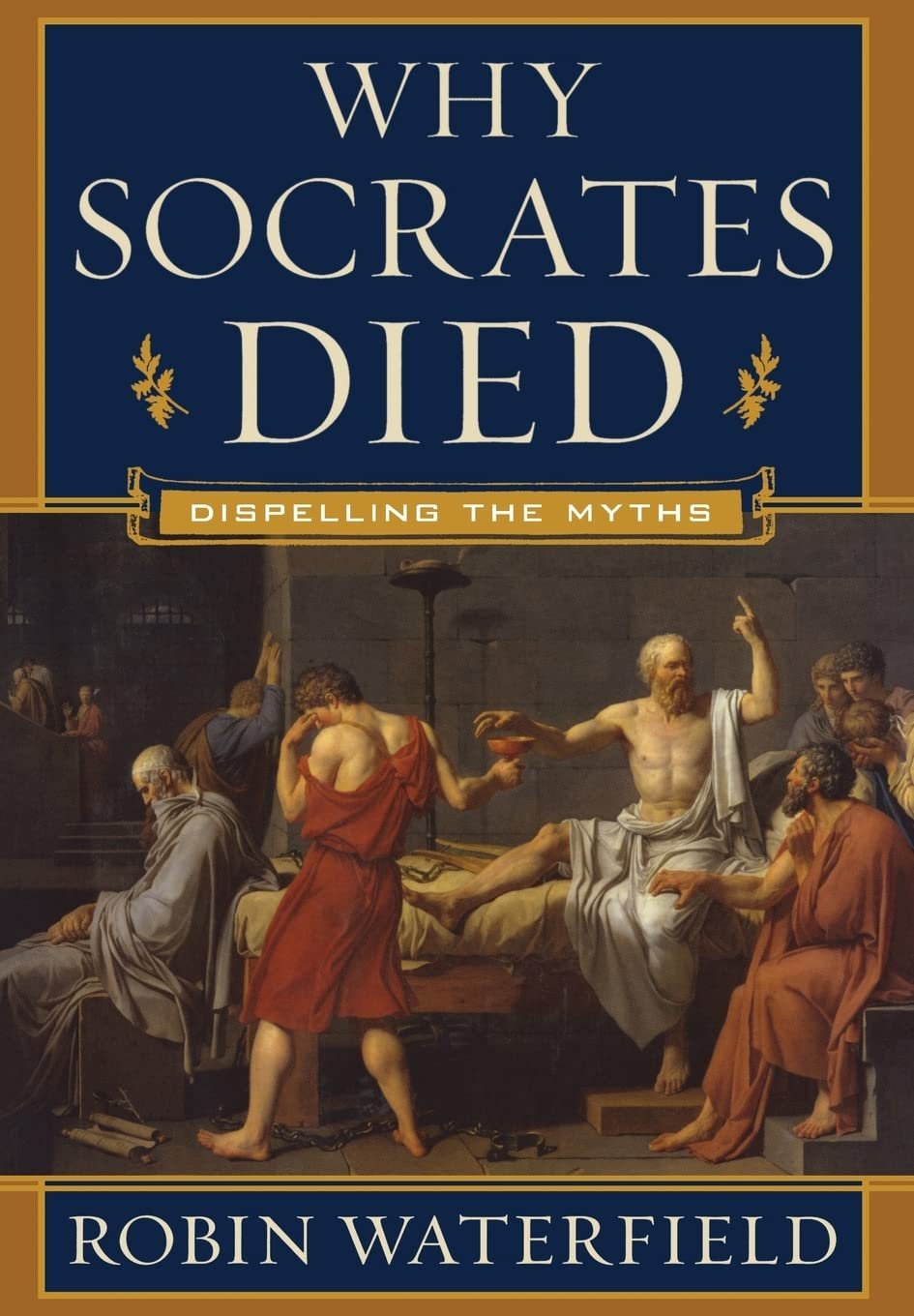- Why Socrates Died: Dispelling the Myths

- Author: Robin Waterfield
- Publisher: W. W. Norton & Company
- Publication Date: June 8, 2009
- Print Length: 284 Pages
- Product Description
Socrates’ trial and death together form an iconic moment in Western civilization. In 399 BCE, the great philosopher stood before an Athenian jury on serious charges: impiety and “subverting the young men of the city.” The picture we have of it – created by his immediate followers, Plato and Xenophon, and perpetuated in countless works of literature and art ever since – is of a noble man putting his lips to the poisonous cup of hemlock, sentenced to death in a fit of folly by an ancient Athenian democracy already fighting for its own life. But an icon, an image, is not reality, and time has transmuted so many of the facts into historical fable.
Aware of these myths, Robin Waterfield has examined the actual Greek sources and presents here a new Socrates, in which he separates the legend from the man himself. As Waterfield recounts the story, the charges of impiety and corrupting the youth of Athens were already enough for a death sentence, but the prosecutors accused him of more. They asserted that Socrates was not just an atheist and the guru of a weird sect but also an elitist who surrounded himself with politically undesirable characters and mentored those responsible for defeat in the Peloponnesian War. Their claims were not without substance, for Plato and Xenophon, among Socrates’ closest companions, had idolized him as students, while Alcibiades, the hawkish and notoriously self-serving general, had brought Athens to the brink of military disaster. In fact, as Waterfield perceptively shows through an engrossing historical narrative, there was a great deal of truth, from an Athenian perspective, in these charges.
The trial was, in part, a response to troubled times – Athens was reeling from a catastrophic war and undergoing turbulent social changes – and Socrates’ companions were unfortunately direct representatives of these troubles. Their words and actions, judiciously sifted and placed in proper context, not only serve to portray Socrates as a flesh-and-blood historical figure but also provide a good lens through which to explore both the trial and the general history of the period.
Ultimately, the study of these events and principal figures allows us to finally strip away the veneer that has for so long denied us glimpses of the real Socrates. Why Socrates Died is an illuminating, authoritative account of not only one of the defining periods of Western civilization but also of one of its most defining figures.
- About the Author
Robin Waterfield, whose many translations include works by Plato, Plutarch, and Aristotle, currently resides on a farm in Greece. His career spans both academia and publishing.
- Reviews
“In The Death of Socrates (2007), Emily Wilson illuminated the mythmaking process that converted the execution of a famous ancient philosopher into a symbolic tableau incorporated into a wide range of religious and political ideologies. In this much-needed complementary study, Waterfield deflates that mythmaking by probing the historical dynamics surrounding the trial itself. The analysis will surprise readers accustomed to viewing Socrates’ accusers as paranoid defenders of religious superstitions. For a careful parsing of the evidence reveals that when Athenian judges condemned Socrates, they were defending principles still cherished by most twenty-first-century readers: namely, the principles of democracy. Waterfield convincingly establishes that Socrates fell under hostile suspicion largely because of his close ties to young students of deeply anti-democratic sympathies. One of these arrogant young men joined other oligarchs in conspiring against Athens during its bitter war against Sparta; another scripted the atrocities committed by the Thirty Tyrants when they temporarily overthrew Athens’ democratic government. Waterfield shows that even Socrates’ own belief in an ideal government by experts legitimated, elitist, not democratic governance. Such a belief, readers soon realize, would have appeared particularly menacing to Athenian democrats traumatized by the twin shocks of external assault and internal discord. Impressive scholarship redefining an iconic event.” Bryce Christensen
“From the author of Xenophon’s Retreat comes this fascinating study of the history behind the case against Socrates. A useful glossary, bibliography, and extensive notes complete this fine work. A real page-turner.” Ann Oughton, Historical Novels Review
“A thorough and fascinating account of the democratic process of lawmaking and justice in Athens…a learned book in clear, concise prose.” Stewart Desmond, Library Journal
“Of the many introductory studies on the Athenian judicial system, the trial of Socrates, the conflict between Athens and Sparta, and the reasons that democracy gave way to oligarchy in Athens, this is among the clearest, most well-organized and most concise.” Publishers Weekly
“An excellent book. Robin Waterfield writes very well, in a style that is accessible and sophisticated.” Barry Strauss, Cornell University, author of The Trojan War
“A timeless story as well as a vivid tale of its times.” BBC History magazine
